Putin rode into power in the aftermath of a series of apartment bombings he arranged during his stint as Director of the FSB…
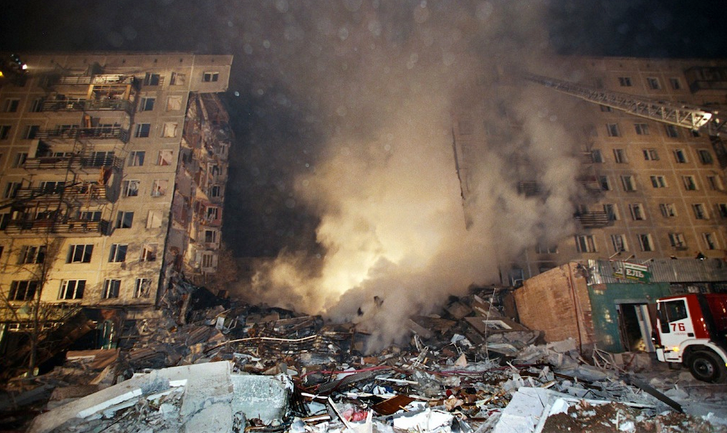
A great many awakening people continue to be in thrall to the cult of personality that’s been built around Vladimir Putin. They have passively and uncritically accepted the endless barrage of Putin-worshiping propaganda put out by sellouts in the alternative media, and they have not bothered to look into things for themselves. If you are one of these people, I ask you to take a moment to set down your emotionally-held beliefs and open your mind. It literally takes only a few minutes to see through Putin’s sheep costume to the wolf that lies beneath, so let’s get going by looking at Putin’s ascent to power in a point-by-point way…
1) The KGB got Putin started in politics in Leningrad, where he quickly became the city’s KGB/FSB mob boss.
While many people are aware that Putin was a KGB agent, few are aware of how the KGB got him started in politics and the mob back in 1990. To get a clear picture of what transpired with Putin during that critical 1990-1991 period, one must sift through a number of incomplete, sloppy, and misleading reports written by people with varying degrees of awareness of the “big picture.” Having just completed such a sifting, let me show you what I found, starting with Putin’s heavily sanitized official Kremlin biography…
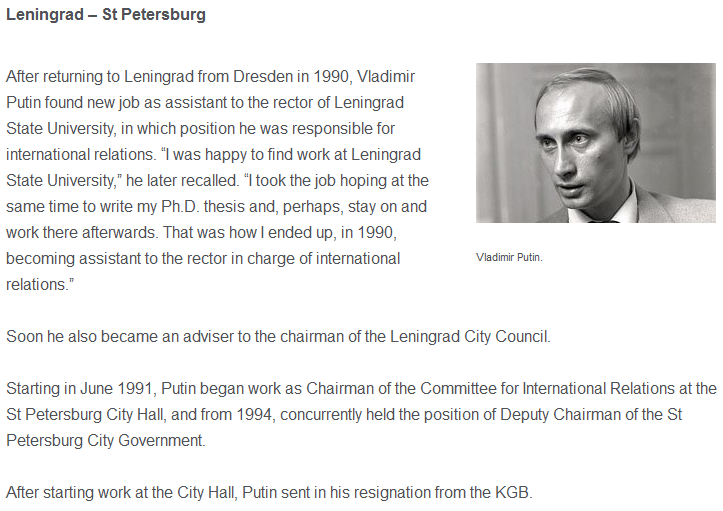
The general public impression of Putin’s personal history is that he left the KGB to enter politics, but as even the Kremlin’s own bio admits, he entered politics while still in the KGB. And what the Kremlin bio fails to admit is that his “international relations” job at Leningrad State University was his new KGB post, where he was assigned to spy on the students…

…From The Washington Post’s January 30, 2000 article Putin’s Career Rooted in Russia’s KGB
As his official bio notes, he also took on the role of “advisor to the Chairman of the Leningrad City Council.” And on what subject did Putin advise him?…
“In May 1990, Putin was appointed Mayor Sobchak’s advisor on international affairs.” [Note: Putin didn’t resign from the KGB until August 20, 1991]- From Wikipedia
“International affairs” was the same job title used in his KGB posting to Leningrad State University, so it stands to reason that his position in the Leningrad government was also a KGB posting…
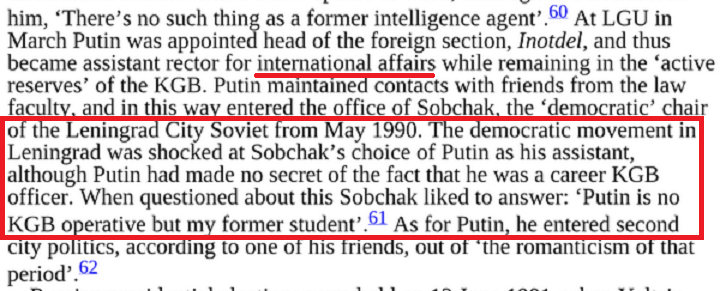
…From Putin: Russia’s Choice by Richard Sakwa
As for the debate over whether Putin’s role in the Leningrad government was KGB-related or not, I found this interesting tidbit in a Moscow Times review of a book by Putin’s former KGB colleague Vladimir Usoltsev…
“Usoltsev suggests that Putin was working for Sobchak as a KGB officer on a special mission.”
No sh*t, Sherlock.
Now if we look closer at Sobchak and his relationship with Putin, we see this [with my comments added in brackets]…
>>> In April 1990, Sobchak was elected a deputy of the Leningrad City Council, and in May he became the chairman of the Council [so Putin joined Sobchak as soon as he became Chairman]. From the beginning his leadership was marked by a strongly authoritarian bent [as one would expect from a KGB operative taking over the city government]. The Council decided to change the structure of the city governance so as to have a Mayor elected by direct elections. The first of such elections in June 1991 were combined with the referendum on the city name. Sobchak won the elections, and the city voted to return to its historical name of Saint Petersburg…
Sobchak was Mayor of Saint Petersburg in 1991–1996… Most of the everyday control of the city structure was handled by two Mayor’s deputies – Vladimir Yakovlev and Vladimir Putin; critics alleged deterioration of city infrastructure, growing corruption, and crime during this time. – From Wikipedia <<<
Going back to Putin: Russia’s Choice, we find a similar narrative of a city being overtaken by corruption during Putin’s tenure…

We also encounter a narrative of the KGB/FSB mafia taking over Saint Petersburg – and later, all of Russia – in another biography of Putin…
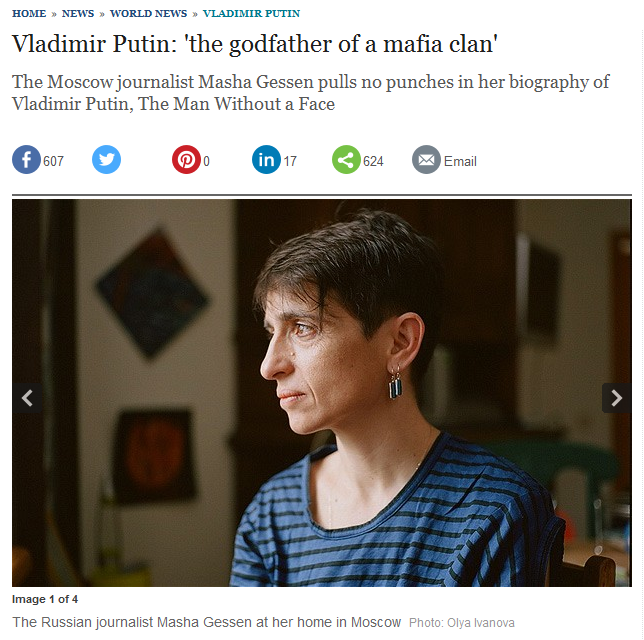
…From The Telegraph. Here is a relevant excerpt…
>>> Gessen’s book, The Man Without a Face: The Unlikely Rise of Vladimir Putin, provides a compelling and exhaustive portrait of a man who rose without trace from being a minor KGB and St Petersburg bureaucrat to become what Gessen describes as ‘the godfather of a mafia clan’, who has amassed a personal fortune that in 2007 was estimated by one Kremlin insider to be $40 billion…
Putin returned to St Petersburg, where he became assistant to the mayor, while continuing in the KGB. For all the reforms that were taking place in Russia, St Petersburg, Gessen writes, was ‘a state within a state’: a place where the KGB remained all-powerful, where local politicians and journalists had their phones tapped, and the murder of major political and business players was a regular occurrence.
‘In other words, very much like Russia itself would become within a few years, once it came to be ruled by the people who ruled St Petersburg in the 1990s.’ In other words, Putin. <<<
Having shown you all this, I would be remiss if I didn’t show you one more thing: Putin and Sobchak’s association with Henry Kissinger (who was one of the architects of what would become the BRICS New World Order) during this time. It was done under the cover of “the Kissinger-Sobchak Commission, set up to attract foreign investment”…
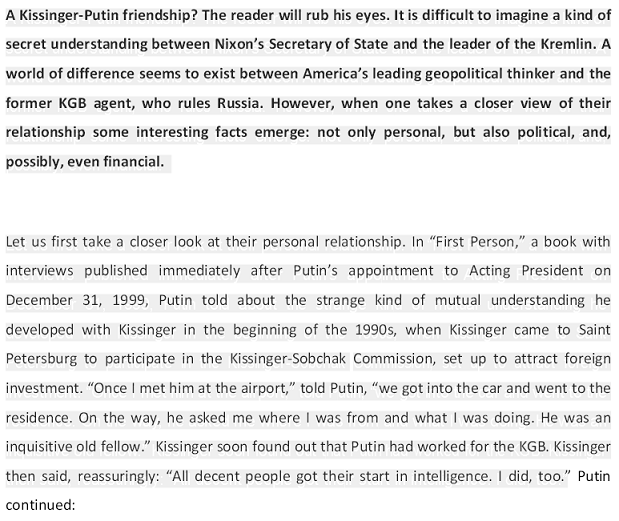
…From The Cicero Foundation
Here is another account of their association from The New York Times…
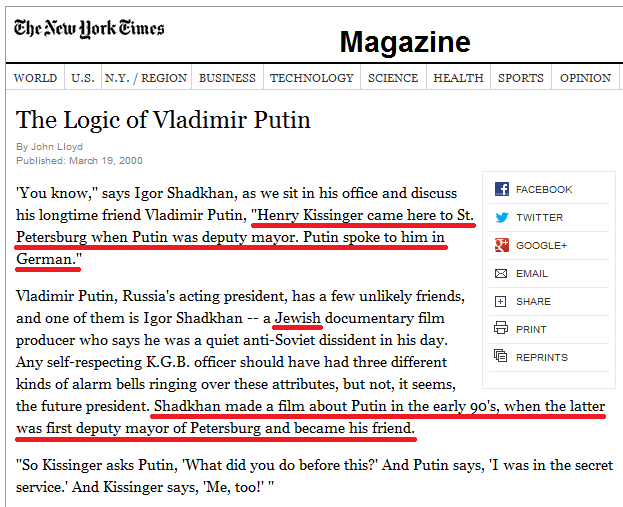
The important facts to be noted from these articles are…
I) Putin has a connection with Kissinger (who is a Cabalist Jew) that goes back at least to the 1990s.
II) Putin was being promoted by a Jewish documentary film maker back in the days he was “only” the Deputy Mayor of Saint Petersburg.
Are you beginning to see the Hidden Hand that guided Putin’s rapid ascent to power?
As for the “aw, shucks” narrative that says Putin and Kissinger didn’t know each other as intelligence agents, that is pure hokum for public consumption. They both work for the globalists, and they knew exactly who each other were. And Kissinger was not in Saint Petersburg to help boost international investment; what the hell would he know about that anyway? He’s not a financial guy; he’s a geopolitical script writer for the globalists, and he was there to coordinate the Russian side of the NWO implementation plan he helped design back in the 1950’s.
Let’s move on to the next point in our point-by-point review of Putin…
2) Putin was placed into the Russian Presidency by the uber-corrupt Boris Yeltsin
“Much of the Yeltsin era was marked by widespread corruption, and as a result of persistent low oil and commodity prices during the 1990s, Russia suffered inflation, economic collapse and enormous political and social problems that affected Russia and the other former states of the USSR. Within a few years of his presidency, many of Yeltsin’s initial supporters had started to criticize his leadership, and Vice President Alexander Rutskoy even denounced the reforms as “economic genocide”.
Ongoing confrontations with the Supreme Soviet climaxed in the 1993 Russian constitutional crisis in which Yeltsin illegally ordered the dissolution of the Supreme Soviet parliament, which as a result decided to try to remove him from office. In October 1993, troops loyal to Yeltsin stopped an armed uprising outside of the parliament building, leading to a number of deaths. Yeltsin then scrapped the existing Russian constitution, banned political opposition and deepened his efforts to transform the economy.
On 31 December 1999, under enormous internal pressure, Yeltsin announced his resignation, leaving the presidency in the hands of his chosen successor, then-Prime Minister Vladimir Putin. Yeltsin left office widely unpopular with the Russian population.” – From Wikipedia
So after crushing his opposition in 1993, pressure again began building on Yeltsin’s government, and it rose to a critical level by the end of the decade. Faced with a potentially uncontrollable release of political tension, Yeltsin’s gang faced a question: how do we controllably release all this public pressure and get Russians to rally around us instead? The answer they settled upon was to stage a big false-flag attack and a changing of the guard. The Russian Apartment Bombings, “Russia’s 9/11,” was the attack they conducted, and Vladimir Putin was the change of guard.
But how did Putin get into position to be elevated to the Presidency? To answer this question, let’s look at the timeline of Putin’s meteoric rise in Moscow…
> June 1996 – After serving as a city bureaucrat and political party organizer in Saint Petersburg, the nationally-unknown Putin arrives in Moscow to become a Deputy Chief of the Presidential Property Management Department in the Yeltsin Administration.
> March 26, 1997 – Yeltsin appoints Putin to the posts of Deputy Chief of Presidential Staff and Chief of the Main Control Directorate of the Presidential Property Management Department.
> May 25, 1998 – Yeltsin appoints Putin to the post of First Deputy Chief of Presidential Staff for regions. Less than two months later, Putin is also appointed Head of the Commission “for the preparation of agreements on the delimitation of power of regions and the federal center attached to the President.” In these positions, Putin was in charge of the central government’s relationships with the regional governments, and Putin did not seem keen on making agreements to share power with the regions. As his Wikipedia bio notes…
“After Putin’s appointment, the commission completed no such agreements, although during Shakhray’s term as the Head of the Commission there were 46 agreements signed. Later, after becoming president, Putin canceled all those agreements.”
> July 25, 1998 – Yeltsin appoints Putin to the post of Director of the Federal Security Service (the FSB). Less than 3 months later, he is also made a permanent member of Russia’s national Security Council. and he went on to become its Secretary in March of 1999.
> August 9, 1999 – “Vladimir Putin was appointed one of three First Deputy Prime Ministers, and later on that day was appointed acting Prime Minister of the Government of the Russian Federation by President Boris Yeltsin. Yeltsin also announced that he wanted to see Putin as his successor. Still later on that same day, Putin agreed to run for the presidency.
On 16 August, the State Duma approved his appointment as Prime Minister with 233 votes in favour (vs. 84 against, 17 abstained), while a simple majority of 226 was required, making him Russia’s fifth PM in fewer than eighteen months. On his appointment, few expected Putin, virtually unknown to the general public, to last any longer than his predecessors. He was initially regarded as a Yeltsin loyalist; like other prime ministers of Boris Yeltsin, Putin did not choose ministers himself, his cabinet being determined by the presidential administration.
Yeltsin’s main opponents and would-be successors were already campaigning to replace the ailing president, and they fought hard to prevent Putin’s emergence as a potential successor. Putin’s law-and-order image and his unrelenting approach to the Second Chechen War, soon combined to raise Putin’s popularity and allowed him to overtake all rivals.” – From Wikipedia
> December 31, 1999 – Yeltsin resigns and hands the Presidency to Putin.
Looking upon this timeline, you notice something quite remarkable…
After arriving in Moscow as an unknown in June of 1996, it took Putin only 3 years and 6 months to rise to the Presidency of Russia. Only 3.5 years!
Needless to say, you can’t achieve such a meteoric rise without powerful forces working in the background to arrange it for you. The globalists obviously had big plans for Vladimir Putin, and that is why the Russian oligarchs elevated him to power so swiftly. An insight into this is offered in Masha Gessen’s Putin biography, The Man Without a Face…
>>> Foremost in the dwindling circle of Yeltsin’s allies and supporters known as ‘the family’ was the oligarch Boris Berezovsky; indeed, many believed Berezovsky to be the real power behind Yeltsin’s throne. Berezovsky knew Putin from the early 1990s in St Petersburg when, in the first flush of buccaneering capitalism, Berezovsky was aiming to expand his car dealership and Putin was a minor city bureaucrat.
Putin arranged for Berezovsky to open a service station in the city, and declined to take a bribe. ‘He was the first bureaucrat who did not take bribes,’ Berezovsky told Gessen. ‘Seriously. It made a huge impression on me.’
Berezovsky began to vigorously promote Putin, among ‘the family’ and to Yeltsin himself. He would remember Yeltsin’s reaction on meeting Putin: ‘He seems all right,’ the president said of his putative successor, ‘but he’s kind of small.’ In August 1999 Yeltsin appointed Putin prime minister. <<<
After Putin was installed as the fresh new face of oligarchic rule in Russia, an effort was made to distance him from the scandals of the Yeltsin era and make him look like “change we [Russians] can believe in” (to borrow a phrase from the American version of the trick). It is for this reason that certain oligarchs took on the public roles of “opponents of Putin.” And due to his close ties to Yeltsin, Berezovsky himself took on such a role. As his Wikipedia bio states…
“Berezovsky was politically opposed to the President of Russia Vladimir Putin, since Putin’s election in 2000 and remained a vocal critic of Putin for the rest of his life. In late 2000, after the Russian Deputy Prosecutor General demanded that Berezovsky appear for questioning, he did not return from abroad and moved to the UK, which granted him political asylum in 2003.”
So Berezovsky, who played a behind-the-scenes role in placing Putin into the Presidency of Russia, took on the public role of Putin’s opposition, then ran off to the UK. In doing this, he effectively served as the scapegoat that took the sins of the Yeltsin Administration far away from Putin (so the public would think that Putin’s Administration was a real change from Yeltsin’s). As we’ll discover later when looking at Mikhail Khodorkovsky, Berezovsky wasn’t the only oligarch to play the role of fake opposition to make Putin look good.
On to the next point in our point-by-point review…
3) Putin, Yeltsin, and the FSB Mafia planned and executed the Russian apartment bombings in order to elevate Putin to the Presidency of Russia and redirect the anger of the Russian populace.
The smoking gun which proves this is the curious timeline of events surrounding the September 4-16, 1999 bombings.
> 25 July 1998: Yeltsin appoints Putin to the post of Director of the FSB.
If you are unfamiliar with the FSB, here is a brief description…
“The Federal Security Service of the Russian Federation (FSB)… is the principal security agency of Russia and the main successor agency to the USSR’s Committee of State Security (KGB). Its main responsibilities are within the country and include counter-intelligence, internal and border security, counter-terrorism, and surveillance as well as investigating some other types of grave crimes and federal law violations.” – From Wikipedia
So in the year leading up to the Russian apartment bombings, Vladimir Putin, the FSB mob boss from Saint Petersburg, was the head of Russia’s counter-terrorism agency. This is the public account of what he did while there…
“Putin was reluctant to take over the directorship, but once appointed conducted a thorough reorganization, which included the dismissal of most of the FSB’s top personnel.” – From Wikipedia
In other words, Putin purged everyone who wasn’t part of his criminal subelement of the FSB, and he brought in his goodfellas to take charge. Common sense would suggest that it was also during this time that he and his cohorts planned the apartment bombing operation. He had a year to refine the plan and get all the wrong people in place to carry it out. And when he left the FSB, he left one of his Leningrad / Saint Petersburg goodfellas in charge, Nikolai Patrushev.
> 9 August 1999: This is the day they put everything in position for what was to come…
I) Yeltsin appoints Nikolai Patrushev to the post of Director of the FSB, replacing Putin.
II) Yeltsin appoints Putin to the post of Prime Minister and successor to the Presidency.
SO LESS THAN A MONTH BEFORE THE BOMBINGS, PUTIN GETS PULLED OUT OF THE FSB TO BE PUT IN POSITION TO BE THE NEXT PRESIDENT.
Why did they do this, you ask? They knew that after the bombings, the Russian people would be furious at both the “terrorists” who conducted the attacks and the government officials who didn’t stop it. By putting Putin into the Prime Minister post, they shielded him from public fury. Any blame for incompetence in not preventing the bombings would fall on Patrushev (the FSB head) and Yeltsin (the head of the government), not Putin. And by taking on the role of the “strong man” during his stint as Prime Minister, Putin would make himself the ideal figure to take over when Yeltsin resigned, just three months after the bombings.
But where is the solid evidence of the FSB’s hand in the bombings, you also ask? You can find that in the Ryazan Incident. Here is Wikipedia’s narrative of the event (another account can be found here)…
>>> At 20:30 (8:30 p.m.) on 22 September 1999, a resident of an apartment building in the city of Ryazan noticed two suspicious men who carried sacks into the basement from a car with a Moscow license plate. He alerted the police, but by the time they arrived the car and the men were gone. The policemen found three sacks of white powder in the basement, each weighing 50 kilograms (110 lb). A detonator and a timing device were attached and armed. The timer was set to 5:30 AM. Yuri Tkachenko, the head of the local bomb squad, disconnected the detonator and the timer and tested the three sacks of white substance with a “MO-2” gas analyser. The device detected traces of RDX, the military explosive used in all previous bombings. Police and rescue vehicles converged from different parts of the city, and 30,000 residents were evacuated from the area. 1,200 local police officers armed with automatic weapons set up roadblocks on highways around the city and started patrolling railroad stations and airports to hunt the terrorists down.
At 1:30 a.m. on 23 September 1999, the explosive engineers took a bit of substance from the suspicious-looking sacks to a firing ground located about 1 mile (1.6 km) away from Ryazan for testing. During the substance tests at that area they tried to explode it by means of a detonator, but their efforts failed, the substance was not detonated, and the explosion did not occur. At 5 a.m. Radio Rossiya reported about the attempted bombing, noting that the bomb was set up to go off at 5:30 a.m. In the morning, “Ryazan resembled a city under siege”. Composite sketches of three suspected terrorists, two men and a woman, were posted everywhere in the city and shown on TV. At 8:00 a.m. Russian television reported the attempt to blow out the building in Ryazan and identified the explosive used in the bomb as RDX. Vladimir Rushailo announced later that police prevented a terrorist act. A news report at 4 p.m. reported that the explosives failed to detonate during their testing outside the city.
At 19:00 (7 p.m.), Vladimir Putin praised the vigilance of the inhabitants of Ryazan, and called for the air bombing of the Chechen capital Grozny in response to the terrorism acts. He said:
“ If the sacks which proved to contain explosive were noticed, that means there is a positive side to it, if only the fact that the public is reacting correctly to the events taking place in our country today. I’d like …to thank the public… No panic, no sympathy for the bandits. ”Later, the same evening, a telephone service employee in Ryazan tapped into long distance phone conversations and managed to detect a talk in which an out-of-town person suggested to others that they “split up” and “make your own way out”. That person’s number was traced to a telephone exchange unit serving FSB offices. When arrested, the detainees produced FSB identification cards. They were soon released on orders from Moscow.
On 24 September, FSB director Nikolai Patrushev announced that the exercise was carried out to test responses after the earlier blasts. The Ryazan FSB “reacted with fury” and issued a statement saying:
“ This announcement came as a surprise to us and appeared at the moment when the …FSB had identified the places of residence in Ryazan of those involved in planting the explosive device and was prepared to detain them. ”FSB issued a public apology about the incident. <<<
So the fifth planned apartment bombing was prevented, and the FSB’s fingerprints were all over the blown operation. As to why the Ryazan explosives didn’t detonate, this is the Google translation of what the Kommersant reported at the time…
“A kilogram of the substance seized in the house, explosives were taken to a landfill, located seven kilometers from the city. There they tried to undermine it with a detonator, also made of a hunting cartridge, but the explosion did not happen. Under assumptions of experts, terrorists miscalculated the proportions, mixing explosives with sugar.”
And why would the FSB mix RDX explosive with sugar? I found the answer after a few minutes of looking around…
“RDX, an initialism for Research Department explosive, is an explosive nitroamine widely used in military and industrial applications….
In its pure, synthesized state RDX is a white, crystalline solid. It is often used in mixtures with other explosives and plasticizers, phlegmatizers or desensitizers. RDX is stable in storage and is considered one of the most powerful and brisant of the military high explosives.” – From Wikipedia
Since sugar is also a crystalline solid, it is used to dilute and desensitize RDX in order to make it safer to transport and handle. I found reference to this practice on a US military website (on PDF page 24)…
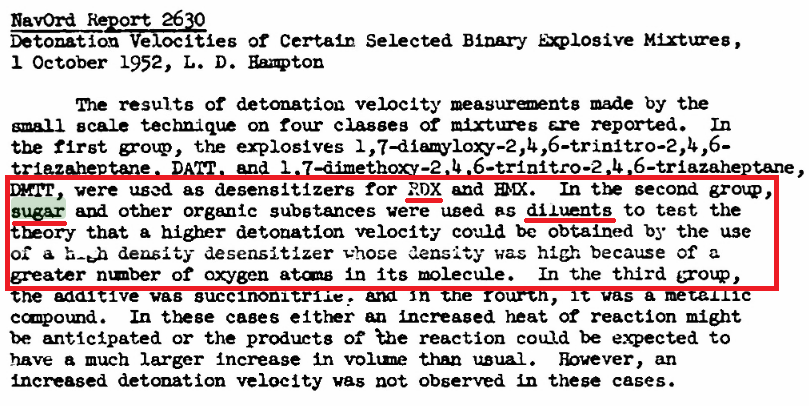
Since sugar is used as a diluent, it stands to reason that if you add too much, the explosives won’t detonate. And this raises a question: were the FSB agents assigned to the Ryazan bombing a bunch of fu*kups, or did they intentionally over-dilute the RDX in order to sabotage the bombing and stop their superiors’ terror campaign?
Switching gears to a more positive note, all of this is not escaping the attention of many Russians. I ran across this article while I was looking into Ryazan…
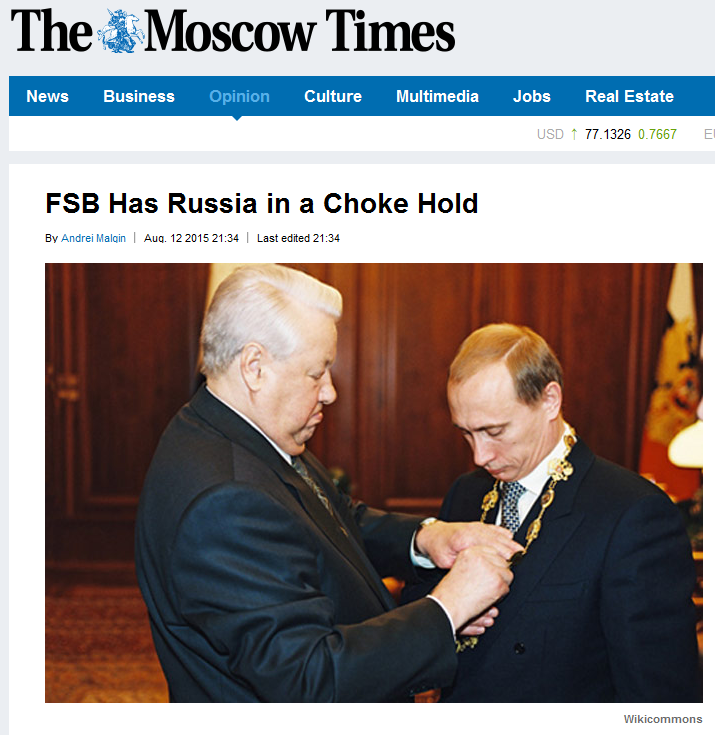
…From The Moscow Times. I recommend reading the whole thing, but here is an excerpt to get you started…
“Let’s recall the events of these days 16 years ago.
On Aug. 9, 1999, Yeltsin appointed Vladimir Putin acting head of the Russian government. On the same day, in a televised speech, Yeltsin named Putin as his successor. A week later, on Aug. 16, the parliament confirmed him as the new prime minister, making his role as head of government official. An unwell Yeltsin completely handed over the reins of government to Putin.
That was when security forces came to power in Russia. Since that time, they have destroyed civil society and freedom of the press, taken over and destroyed independent business, eliminated elections, and subordinated under themselves and corrupted all spheres of life, from the courts system to schools, making this country a global outcast…
There may be different theories about these events, but some facts remain the same: the feeling of horror that took over the country in the first weeks and months of Putin’s tenure as prime minister actually helped improve his ratings…
We can no longer dream of the departure of the security forces. They won’t leave. Like a cancerous tumor, metastasizing into all the organs of the body, they will only die now when the entire organism does. This tumor is no longer operable, and there is no more hope for recovery.”
Setting aside the classic Russian pessimism of the last paragraph, it’s good to see that people in Moscow still have the courage to speak out. And although our adversaries may seem all-powerful and invincible, maintaining our efforts is the only possible path to victory. The outcome of all this is only partially within our control, but our decision on whether or not to be quitters is entirely in our hands.
To see the final section of this entry, click here.
Love always…
(P.S. – 18 February 2016)
Keep an eye on Khodorkovsky
As I continue looking into Putin’s connections with the oligarchs, I’ve come across a very interesting figure who seems to be Putin’s controlled opposition in Russia, Mikhail Khodorkovsky…
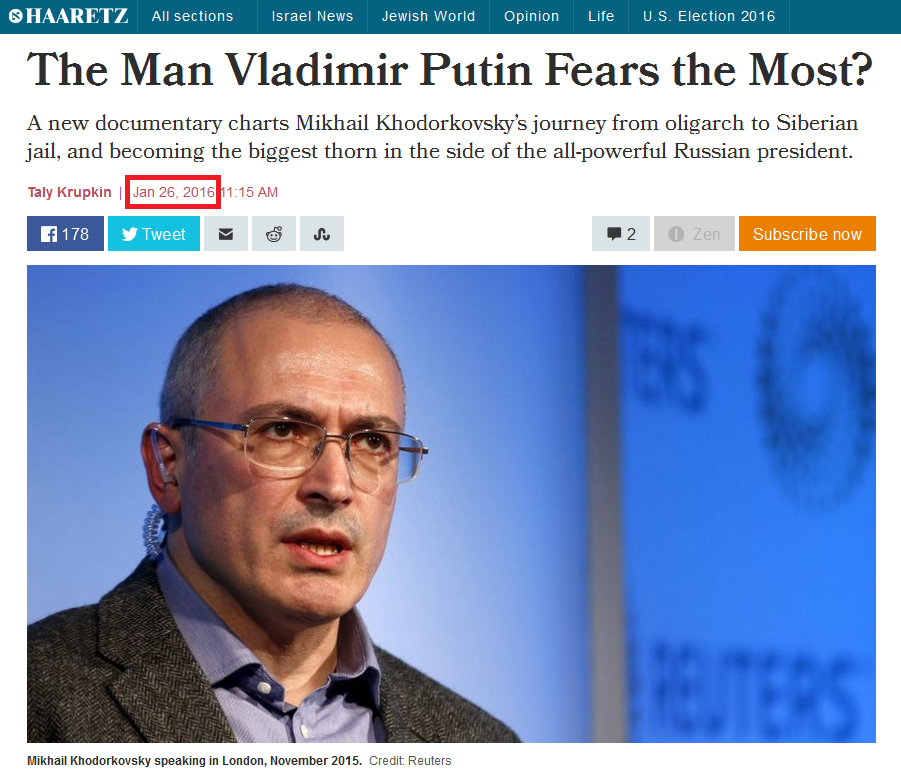
…From Haaretz
Keep an eye on him. While I haven’t yet had time to discern his exact role in all this, whatever it is seems to have been set in motion on a Masonically-significant day this month…
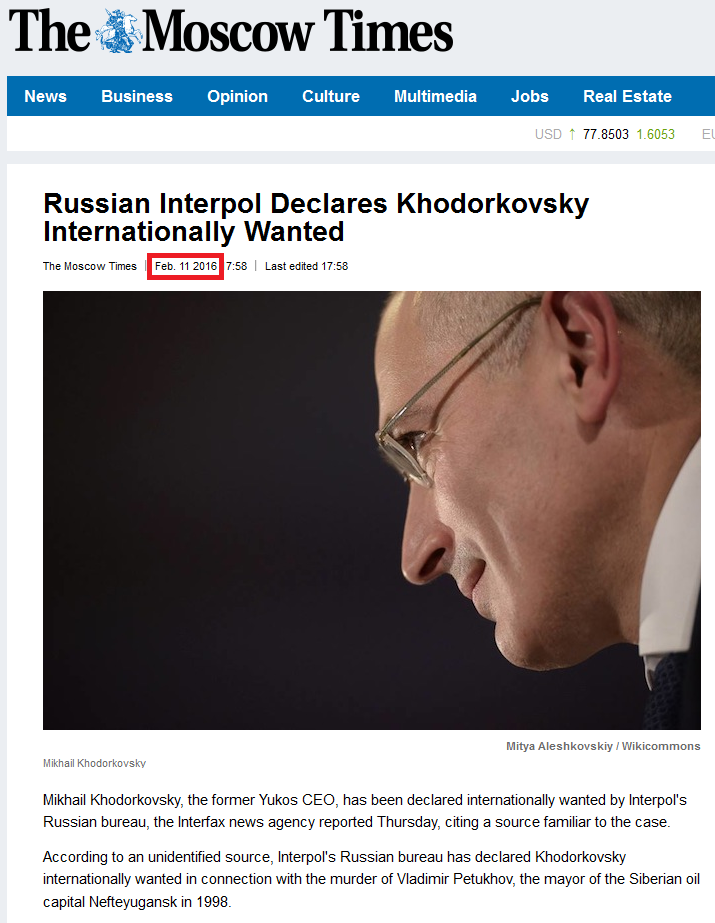
…From The Moscow Times
The globalists would not be adding him to the mix during this critical year if it wasn’t something important. Will they use him to make Putin look good, or are they going to some sort of Plan B and setting the stage for Putin’s replacement? We’ll discover the answers to these questions and others as we go forward.
(P.P.S. – Same Day) – On a hunch, I decided to see if Khodorkovsky had some kind of connection to Medvedev, and I’ve found information that suggests Khodorkovsky might play a role in Medvedev’s scripted betrayal of Putin this September. I’ll flesh out the details in an upcoming addendum.
